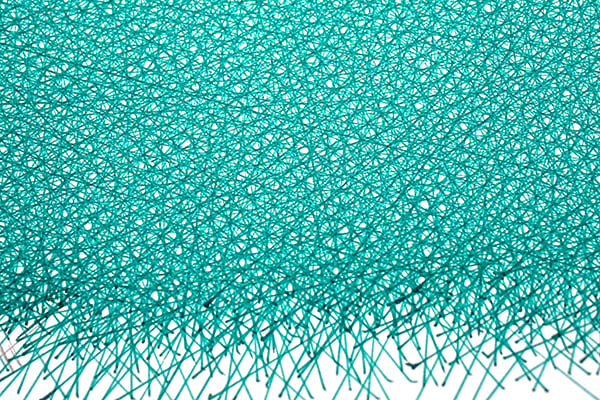
Photo: courtesy Davidson Contemporary.
A dense network of intersecting lines forms an intricate, almost lace-like pattern in British artist Sam Messenger‘s most recent body of work, on view at Chelsea’s Davidson Contemporary gallery.
Though they appear deeply textured, each piece uses only ink and paper. Their creation, however, is “very process-driven, with a lot of attention to detail,” Charles Davidson, the gallery’s senior director, told artnet News during a recent tour of the exhibition.
Sam Messenger, NI.22.16 (2016).
Photo: courtesy Davidson Contemporary.
Messenger, who often begins his work from a mathematical premise such as the Fibonacci sequence, was inspired in this case by an issue that has plagued artists for centuries. “I’ve been interested in…ways of drawing a perfect circle with only a straight edge and a pen,” he told artnet News in a phone interview.
Closer inspection reveals that each drawing is in fact full of tiny circles, which appear where the straight lines intersect. Messenger fills each page with parallel lines spaced either two or three millimeters apart, then rotates his straight edge by either 10 or 20 degrees, and covers the page yet again. “Having these kind of parameters is a good starting point, so you’re not just staring at the blank page,” he explained.
“Each layer you do, something else emerges,” Messenger added. When he’s made it all the way around, the work is completed, and the field of circles is fully formed. The works vary based on how much ink winds up on the page, which is in turn determined by three variables: The thickness of the pen tip, the spacing between the lines, and what angle is used.
“Sam Messenger: 13 Cycles,” installation view.
Photo: courtesy Davidson Contemporary.
Although Messenger denies that his process is particularly meditative, he admits that he does “become aware of how the pen is touching the paper,” he says, “and all these little details you wouldn’t normally notice.”
The series’ title, “Nimbus,” evokes the halo, which is visible in Messenger’s work in the naturally occurring circles that arise from his regimented process. The word has another, equally apt meaning, however. “For me, the first thing I though of was the rain cloud,” said Davidson, who describes the appearance drawing’s delicate patterns as “rain hitting the surface of the water.”
As precise as Messenger’s methods are, the artist’s hand can’t help but reveal itself, through inevitable deviations from the proscribed plan. “I think if they were machine made… they wouldn’t be interesting to me,” Messenger admitted.
Careful examination reveals the subtle details: slight irregularities in the spacing, areas where the ink is less heavily applied, or where the pen tip scratches the paper. “All these things are what interest me most,” said Messenger. “Where the rules fall apart.”
The exhibition spans two floors at the gallery, with black and white drawings on the first level, and colored works upstairs, some created by overlaying multiple colors, such as red and yellow, to create to what appears to be a uniform orange field. Expanding the color palette for “Nimbus” was for Messenger a “direct way of representing the same works, but showing how their presence and atmosphere changes with just one simple color use.”
Messenger “does no do color very often,” noted Davidson, adding that when the artist chooses to, he does so “very intentionally, usually very subtly.”
Sam Messenger, NI.13.15 (2016), detail.
Photo: courtesy Davidson Contemporary.
The works only become more appealing when one considers the awe-inducing amount of labor that goes into the creation of each one—especially given the tight deadline Messenger gave himself to prepare for this exhibition.
“I wanted everything in the show to be fresh, new work,” he said, admitting that he began in early December, and worked up to 20 hours a day to get everything done in time. The “unusually intensive” process was quite draining, says Messenger. “My eyesight suffers.”
See more works from the exhibition below:
Sam Messenger, NI.14.15 (2015).
Photo: courtesy Davidson Contemporary.
Sam Messenger, NI.20.16 (2016).
Photo: courtesy Davidson Contemporary.
Sam Messenger, NI.18.16 (2016), detail.
Photo: courtesy Davidson Contemporary.
Sam Messenger, NI.17.16 (2016).
Photo: courtesy Davidson Contemporary.
“Sam Messenger: 13 Cycles” is on view at Davidson Contemporary, February 25–April 9, 2016.